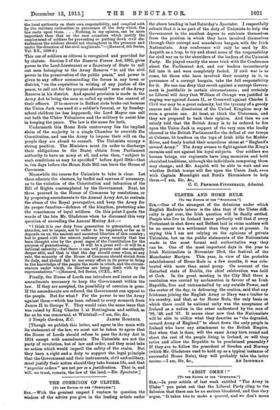ULSTER AND HOME RULE.
[To THY EDITOR Of THZ "SPECTATOR."] SIR,—One of the strangest of the delusions under which English Radicals labour is the idea that if the Ulster diffi- culty is got over, the Irish question will be finally settled. People who live in Ireland know perfectly well that if every Protestant is shot down and Belfast laid in ruins matters will be no nearer to a settlement than they are at present. In saying this I am not relying on the opinions of private Unionists, but on the public statements of the Nationalists made in the most formal and authoritative way they can be. One of the most important days in the year to Irish Nationalists is November 23rd, the festival of the Manchester Martyrs. This year, in view of the probable establishment of Home Rule in a few months, it was cele- brated with more than usual pomp. On account of the disturbed state of Dublin, the chief celebration was held at Cork. In the great meeting in the City Hall there a resolution was carried by acclamation in favour of an Irish Republic, free and untrammelled by any outside Power, and the orator of the day, in delivering the oration, said that any Irishman joining the English Army or Navy was a traitor to his country, and that, as for Home Rule, the only basis on which there could be national unity was the acceptance of Ireland as a nation in the sense understood by the men of '98, '48, and '67. It seems clear now that the Nationalists will be able to utilize what they describe as "the degraded, coward Army of England" to shoot down the only people in Ireland who have any attachment to the British Empire. But when that is done, will the same Army turn round and shoot the rest of the people living in Ireland, or will they retire and allow the Republic to be proclaimed peaceably ? If they are to follow the precedent of Sweden and Norway (which Mr. Gladstone used to hold up as a typical instance of successful Home Rule), they will probably take the latter


























































 Previous page
Previous page